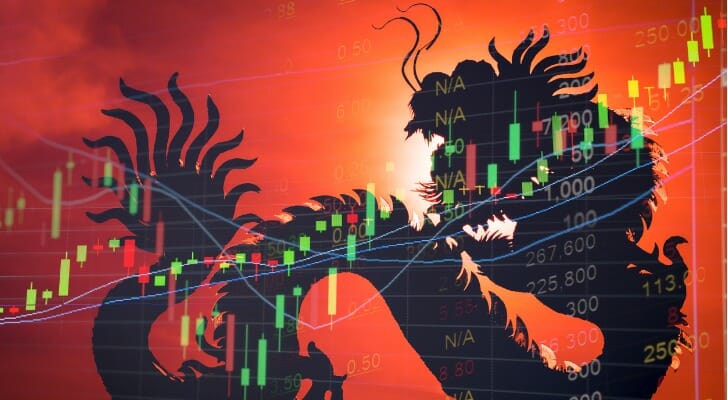 As the world’s largest country by population and second-largest by gross domestic product, China represents a major investment opportunity. The country has the biggest retail market and Chinese buyers consume more automobiles and smart phones than any other. However, investing in China carries significant risks, including its incomplete transition from a centrally planned economy to free markets and the risk of a trade war with the United States, according to the Congressional Research Service. Investors who want to invest in Chinese securities can purchase exchange-traded funds (ETFs), American Depositary Receipts (ADRs) and shares of individual Chinese firms. Here’s what you need to know.
As the world’s largest country by population and second-largest by gross domestic product, China represents a major investment opportunity. The country has the biggest retail market and Chinese buyers consume more automobiles and smart phones than any other. However, investing in China carries significant risks, including its incomplete transition from a centrally planned economy to free markets and the risk of a trade war with the United States, according to the Congressional Research Service. Investors who want to invest in Chinese securities can purchase exchange-traded funds (ETFs), American Depositary Receipts (ADRs) and shares of individual Chinese firms. Here’s what you need to know.
Investing in opaque countries like China requires the special kind of expertise that a financial advisor can provide for you.
One of China’s biggest appeals to investors is its rapid economic growth. The country is anticipated to post 8.5% growth in GDP in 2021 before slowing to a still-robust 5.4% in 2022, according to the World Bank. It is forecast to maintain annual growth in GDP much faster growth than other major economies for the next several years.
Investing in China with ETFs
A convenient way for American investors to invest in China is through ETFs. China ETFs own baskets of shares that track the performance of indexes such as the Shanghai Composite Index. This diversification can help reduce risk.
China ETFs trade on U.S. exchanges like ordinary stocks, which makes it easy to invest in them. Among the better known and largest such ETFs are KraneShares CSI China Internet ETF, iShares MSCI China ETF and the S&P SPDR China ETF.
Investing in China with ADRs
Investors can also purchase Chinese ADRs. These are certificates issued by U.S. banks or brokerage firms. Each ADR represents a share of an individual foreign company. ADRs are traded on U.S. exchanges including the New York Stock Exchange, NASDAQ and the over-the-counter market.
ADRs are available for shares of many of the largest Chinese businesses. These include e-commerce giants Alibaba and JD.com, mobile marketplace Pinduoduo and Internet technology provider Baidu.
Investing in China with Individual Stocks
Finally, investors may be able to buy and sell Chinese securities directly on the Chinese stock exchanges, such as the Shanghai Stock Exchange. This exchange, the largest in mainland China and the world’s fourth-largest by total market capitalization provides access to many large Chinese firms that don’t have ADRs.
However, foreign investors face significant restrictions on their access to the Shanghai and other Chinese exchanges. Because of these limitations, most investors outside China use ETFs and ADRs to gain exposure to the Chinese market.
Investing in Hong Kong
 The Hong Kong Exchange (HKEX) is the largest Asian stock exchange, with more than 2,500 listed companies and total market capitalization of about $6.7 trillion. Its history goes back to the 19th century. In 2000 it merged with the Hong Kong Futures Exchange and another securities clearing company to form a parent company. In 2012 the parent acquired the London Metal Exchange. Several times in recent years the HKEX has ranked as the top exchange in the world for a company to hold an initial public offering (IPO).
The Hong Kong Exchange (HKEX) is the largest Asian stock exchange, with more than 2,500 listed companies and total market capitalization of about $6.7 trillion. Its history goes back to the 19th century. In 2000 it merged with the Hong Kong Futures Exchange and another securities clearing company to form a parent company. In 2012 the parent acquired the London Metal Exchange. Several times in recent years the HKEX has ranked as the top exchange in the world for a company to hold an initial public offering (IPO).
As is often the case with international markets, the easiest way for many U.S.-based investors to invest in the HKEX is through exchange-traded funds listed on U.S. exchanges. The largest HKEX ETF is the iShares MSCI Hong Kong ETF (EWH), which has been around more than 25 years and has $1.5 billion in assets under management.
Another way for U.S. investors to invest in Hong Kong is through ADRs, but only a limited number of HKEX companies are available through ADRs.
Chinese Investing Risks
One of the risks for investors who put money into China is the fact that, even after decades of increasing market freedom, the Communist government still retains almost unlimited ability to impact the economy and the market. This power can be exercised in the form of crackdowns on individual companies or major policy changes that affect many or all companies – sometimes without warning.
Also, trade tensions between the U.S. president and China led both countries to slap tariffs on each others’ exports in 2018. That led to a sharp selloff in the Chinese markets. While tensions have eased since, a recurrence of a trade war remains possible.
Although the threat of government intervention is always present in China, the country still lacks many of the regulatory safeguards that investors in markets in other countries are accustomed to. Corporate financial recordkeeping, for instance, is still not up to the standards of most major economies.
Finally, ownership of Chinese companies is concentrated in insider holdings, which together with opaque recordkeeping can lead to fraud and price manipulation. Also, short selling is a bigger problem, with Chinese suffering attacks from short sellers more frequently than in the United States.
Bottom Line

By any measure, China is one of the leading economies in the world. It is also growing much faster than other large economies. These characteristics make it a natural target for investors. Restrictions imposed by the government make it difficult for foreigners to trade in securities issued by Chinese firms, however. For that reason, most U.S. and other non-Chinese investors use China-focused ETFs and ADRs representing shares of Chinese companies to participate in the market. Investors in China also face significant potential risks, including currency fluctuations, trade wars with other countries and policy changes by the Communist government.
Tips on Foreign Investing
- The potential for high returns on investments in China is accompanied by risks that are unfamiliar to many American investors, even those with experience in U.S. markets. An experienced and qualified financial advisor can help evaluate the risk and return equation in Chinese investments. Finding a qualified financial advisor doesn’t have to be hard. SmartAsset’s free tool matches you with up to three financial advisors in your area, and you can interview your advisor matches at no cost to decide which one is right for you. If you’re ready to find an advisor who can help you achieve your financial goals, get started now.
- Make sure you have a clearly thought-out strategy for allocating assets to non-U.S. securities. Our free asset allocation calculator can help you maintain your desired allocations.
Photo credit: ©iStock.com/bjdlzx, ©iStock.com/CHUNYIP WONG, ©iStock.com/NanoStockk